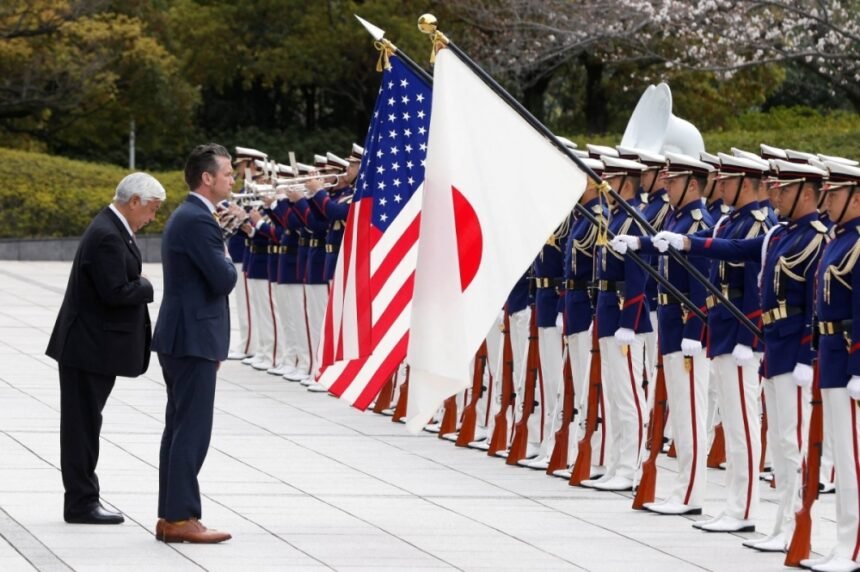Tokyo: PonteSud – News Desk
Japan has canceled a high-level meeting with the U.S. set for July following a demand that Tokyo spend even more on defense, according to a media report.
Tokyo abruptly scrapped annual “two-plus-two” security talks involving the allies’ top diplomats and defense chiefs less than two weeks before the meeting after the U.S. asked Japan to hike its defense budget to 3.5% of gross domestic product, the Financial Times reported Friday, citing unidentified sources.
Defense Minister Gen Nakatani and Foreign Minister Takeshi Iwaya had been scheduled to meet U.S. Secretary of State Marco Rubio and Defense Secretary Pete Hegseth in Washington on July 1 for the talks.
Asked about the report at a news conference Friday, U.S. State Department spokesperson Tammy Bruce said the U.S. had “no comment on that at this point.” The Pentagon did not immediately respond to requests for comment.
The report said that the U.S. had initially asked Japan to spend 3% of GDP on defense, though Pentagon officials told The Japan Times earlier that it had set a “global standard” for Tokyo and other U.S. allies to spend 5% of GDP on defense, in the first official confirmation that Washington is asking Tokyo to pump up its defense budget even further.
The reason for the discrepancy was not immediately clear, though the Pentagon has been gripped by upheaval, including high-level dismissals and scandals in recent months under Hegseth.
The Financial Times said the new, higher demand was made in recent weeks by Elbridge Colby, the Defense Department’s No. 3 official, sparking anger in Tokyo. Colby said during his confirmation hearing in March that Japan “should be spending at least 3% of GDP on defense as soon as possible,” citing the growing military threat from China and North Korea.
Ostensibly pacifist Japan has in recent years undertaken a dramatic transformation of its security policy, including a five-year plan to ramp up defense spending to 2% of GDP by 2027.
But pouring even more cash into defense coffers would come with significant political costs as the government focuses on domestic economic priorities and amid growing uncertainty over how to secure funds. Japan is currently getting far less bang for its buck as inflation and the yen’s diminishing value erode its plans for the country’s largest military buildup since World War II.
The Financial Times report, citing a senior Japanese official, said the decision to cancel the meeting was also related to the July 20 Upper House election in which the ruling Liberal Democratic Party is expected to lose seats.
Nakatani said in April that defense spending was within striking distance of the 2% target, at 1.8% of GDP. A Defense Ministry panel of experts, meanwhile, is reportedly set to recommend that the government consider hiking defense spending beyond 2%, and Prime Minister Shigeru Ishiba has said that future budgets “may top 2%, if needed,” depending on the security environment.
Ishiba and senior Japanese officials, however, have said that Japan will not be told how much to spend, reiterating that what is most important is the substance of strengthened defense capabilities, not arbitrary figures.
The issue of defense spending among U.S. allies and partners will be at the top of the agenda at next week’s NATO leaders’ summit in The Hague, which Ishiba is also set to attend.
Tensions over security issues and trade have grown since Trump took office, with the U.S. president railing against his county’s alliance with Japan, calling the partnership, which turns 65 this year, unfair and “one-sided,” while threatening Tokyo and other allies and partners with onerous tariffs on key sectors such as automobiles and steel.







